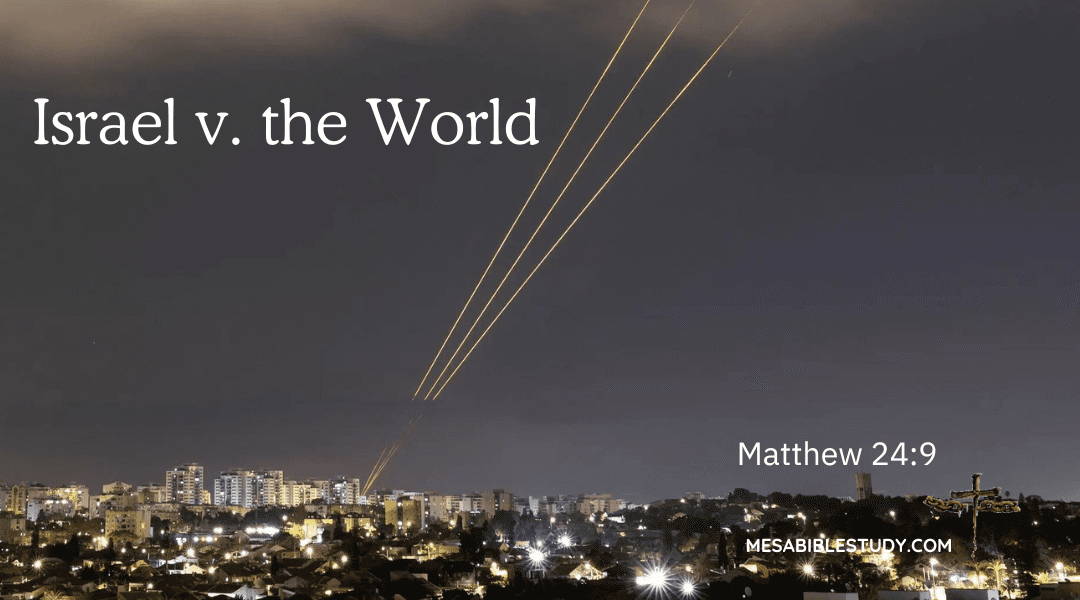
by Jamie Pantastico | Jul 20, 2024 | Devotionals |
Hebrews 12:1-2
“Therefore we also, since we are surrounded by so great a cloud of witnesses, let us lay aside every weight, and the sin which so easily ensnares us, and let us run with endurance the race that is set before us, looking unto Jesus, the author and finisher of our faith, who for the joy that was set before Him endured the cross, despising the shame, and has sat down at the right hand of the throne of God.”
Life often feels like an endless series of challenges. “If it isn’t one thing, it’s another”—another bill, another loss, another tragic event, it seems like it’s never ending. The author of Hebrews encourages us to lay aside every weight and sin that hinders us, and to run with endurance, keeping our eyes fixed on Jesus. The Lord of glory is our ultimate example, having endured the cross for the joy set before Him.
‘looking unto Jesus, the author and finisher of our faith, who for the joy that was set before Him endured the cross, despising the shame, and has sat down at the right hand of the throne of God.’
Hebrews 12:2
As we move forward in our walk with Christ, we must let go of the things that hold us back, including our past sins and failures. The gospel empowers us to run this race with endurance, knowing that Jesus has already secured our victory.
The Daily Battle and How to Fight
Our battle is not against flesh and blood but against principalities, powers, and the rulers of darkness. This spiritual battle requires the most powerful weapon God has given us—His Word. Daily and faithful study of the Bible strengthens us to be “strong in the Lord and in the power of His might.”
Put on the whole armor of God and keep your eyes on Jesus, trusting in His strength and guidance. As ambassadors for Christ, our perseverance and faith can inspire others to also run the race with endurance.
Prayer
Dear Lord and heavenly Father, I come to You with a humble heart full of thankfulness. Please help me to lay aside every weight and sin that hinders me. Give me the endurance to run the race set before me, keeping my eyes fixed on You. Amen.
Daily Power-Up
Take a few minutes to study these passages that pertain to the theme of today’s devotional:
- **Ephesians 6:10-18** – The Armor of God
- **Philippians 3:13-14** – Pressing Toward the Goal
- **2 Timothy 4:7** – Fight the Good Fight
Reading and meditating on these verses will help you stay focused on God’s will and strengthen you for the race ahead.

by Jamie Pantastico | Jul 20, 2024 | Daily Encouragement |
1 Corinthians 15:1-4 declares the gospel by which we are saved: “Moreover, brethren, I declare to you the gospel which I preached to you, which also you received and in which you stand, by which also you are saved, if you hold fast that word which I preached to you—unless you believed in vain. For I delivered to you first of all that which I also received: that Christ died for our sins according to the Scriptures, and that He was buried, and that He rose again the third day according to the Scriptures.”
Romans 1:16 emphasizes the power of this gospel: “For I am not ashamed of the gospel of Christ, for it is the power of God to salvation for everyone who believes, for the Jew first and also for the Greek.”
Ephesians 2:8-9 makes it clear that our salvation is not by works but by grace through faith: “For by grace you have been saved through faith, and that not of yourselves; it is the gift of God, not of works, lest anyone should boast.”
This gospel, given to the Apostle Paul (Galatians 1:11-12), is the gospel by which all mankind will be judged (Romans 2:16). It is the one and only gospel that can save us from our sins and grant us entry into God’s heaven. Salvation is appropriated by faith alone in the finished work of Jesus Christ—His death, burial, and resurrection—apart from the law and works.
‘in the day when God will judge the secrets of men by Jesus Christ, according to my gospel.’
Romans 2:16
Remember, it’s not by our deeds but by our faith in the death, burial, and resurrection of Christ that we are saved. Hallelujah!
#Gospel #Salvation #FaithAlone #1Corinthians15 #Romans1 #Romans2 #Ephesians2 #JesusSaves #Grace #EternalLife

by Jamie Pantastico | Jul 19, 2024 | Daily Encouragement |
The Bible contains numerous prophecies about the end times, and one of the most striking is that the entire world will turn against Israel. This is not just a theoretical possibility; it is a certainty as we see this very thing unfolding right before our eyes. The Lord Jesus Himself spoke of this coming reality, making it all the more significant. Matthew 24:9 serves as a key verse, as it comes directly from Jesus during His earthly ministry:
Matthew 24:9: “Then they will deliver you up to tribulation and kill you, and you will be hated by all nations for My name’s sake.”
This prophecy indicates a time of unprecedented global hostility towards Israel. Today, we can already see signs of this animosity, as nations and even former allies turn their backs on the Jewish state. This trend is particularly evident in the widespread anti-Semitism and opposition to Israel’s right to exist.
Key Verses Highlighting Global Opposition to Israel
Here are several Bible verses that indicate the whole world will be against Israel in the end times:
- Zechariah 12:2-3: “Behold, I will make Jerusalem a cup of drunkenness to all the surrounding peoples, when they lay siege against Judah and Jerusalem. And it shall happen in that day that I will make Jerusalem a very heavy stone for all peoples; all who would heave it away will surely be cut in pieces, though all nations of the earth are gathered against it.”
- This verse prophesies that Jerusalem will become a point of contention for all nations, resulting in their downfall when they oppose God’s chosen city.
2. Zechariah 14:2: “For I will gather all the nations to battle against Jerusalem; the city shall be taken, the houses rifled, and the women ravished. Half of the city shall go into captivity, but the remnant of the people shall not be cut off from the city.”
- This prophecy speaks of a future siege where all nations will gather against Jerusalem, highlighting the global scale of opposition. Many Jews will be slaughtered much like the October 7th massacre. But God will save a remnant, He will supernaturally protect them just like He did in the 40 years they wondered in the desert.
3. Joel 3:2: “I will also gather all nations, and bring them down to the Valley of Jehoshaphat; and I will enter into judgment with them there on account of My people, My heritage Israel, whom they have scattered among the nations; they have also divided up My land.”
- In this verse, God declares His judgment against the nations for scattering His people and dividing His land, reinforcing the theme of global hostility.
4. Revelation 16:14: “For they are spirits of demons, performing signs, which go out to the kings of the earth and of the whole world, to gather them to the battle of that great day of God Almighty.”
- This verse describes demonic spirits gathering the kings of the earth for a final battle, indicating universal opposition to God’s plan.
5. Revelation 19:19: “And I saw the beast, the kings of the earth, and their armies, gathered together to make war against Him who sat on the horse and against His army.”
- Here, the kings of the earth and their armies unite to wage war against Jesus, further illustrating the global rebellion against God’s authority.
God’s Unchanging Plan for Israel
Despite the overwhelming opposition, God’s covenants with Israel remain unbreakable. The Abrahamic Covenant (Genesis 12:1-3), the Mosaic Covenant (Exodus 19:4-6), the Land Covenant (Genesis 15:18), and the Davidic Covenant (2 Samuel 7:4-29) all affirm that God has a special, unchanging plan for Israel. These covenants guarantee that Israel will ultimately be restored and will reign with Christ in the Millennial Kingdom.
As believers, it’s crucial to understand these prophecies and the significance of Israel in God’s redemptive plan. The scriptures remind us that while Israel will face unparalleled tribulation, God’s promises to His chosen people will be fulfilled. The end times will culminate in Jesus’ return, where He will reign as King of kings and Lord of lords, establishing His kingdom with Israel at its center.
By studying these prophecies and understanding their implications, we can gain a deeper appreciation for God’s faithfulness and His ultimate plan for humanity.

by Jamie Pantastico | Jul 18, 2024 | Devotionals |
2 Corinthians 5:7
“For we walk by faith, not by sight.” – 2 Corinthians 5:7
ATTENTION: You can not build your faith if you are not studying God’s word.
Devotional: In the hustle and bustle of our daily lives as believers, there is no doubt that many of us feel overwhelmed and on the brink of despair. Yet, as believers, we are called to walk by faith and not by sight. Our faith is not based on what we see or feel, but on the unchanging promises of God.
Paul encourages us in Romans 8:28, “And we know that all things work together for good to those who love God, to those who are the called according to His purpose.” This assurance provides a foundation for our faith, reminding us that God is always at work for our good, even in challenging times.
Hebrews 11:6 further emphasizes the importance of faith: “But without faith it is impossible to please Him, for he who comes to God must believe that He is, and that He is a rewarder of those who diligently seek Him.” Our relationship with God hinges on our faith. There are no shortcuts or alternatives. We must believe what God’s Word says, period.
Let us embrace our daily walk with faith, trusting in God’s promises and His steadfast love. Remember, faith is not about seeing or feeling, but about believing in the truth of God’s Word. Stay encouraged, knowing that God is with you, guiding your steps and working everything out for your good.
Prayer: Heavenly Father, I come to you in Jesus name, with thanksgiving. Please help me to walk by faith and not by sight. Strengthen my heart to trust in Your promises, especially when times are tough. Remind me that You are always working for my good and that faith is essential to our relationship with You. In Jesus’ name, Amen.

by Jamie Pantastico | Jul 9, 2024 | Daily Encouragement, Devotionals |
Key Verse:
Hebrews 10:14: “For by one offering He has perfected forever those who are being sanctified.”
In Hebrews 10:11-13, we see the futility of the old sacrificial system; the law was perfect but could only condemn and it was impossible to keep. The priests stood daily, offering the same sacrifices repeatedly, which could never take away sins. However, Christ, after offering one sacrifice for sins forever, sat down at the right hand of God, signifying the completion and perfection of His work.
Supporting Verses: Hebrews 10:11-13: “And every priest stands ministering daily and offering repeatedly the same sacrifices, which can never take away sins. But this Man, after He had offered one sacrifice for sins forever, sat down at the right hand of God, from that time waiting till His enemies are made His footstool.”
Sacrifices made by the priests under the Old Covenant were insufficient to remove sins. They were a shadow pointing to the ultimate sacrifice—Jesus Christ. Only Christ Jesus, the sinless Son of God, could be the perfect offering capable of taking away the sins of the world.
2 Corinthians 5:21: “For He made Him who knew no sin to be sin for us, that we might become the righteousness of God in Him.”
This truth makes clear that Jesus’ sacrifice was complete and final. Through His offering, we are perfected forever, not by our own works, but by His finished work on the cross; His shed blood, death, burial and resurrection (1 Corinthians 15:1-4). This assures us of our salvation and sanctification, encouraging us to rest in His perfect sacrifice (not anything our filthy works can do) and live in the freedom and victory it provides.
Take time to meditate on this amazing grace and live with gratitude, knowing that Jesus’ sacrifice has perfected us forever. Share this truth and walk confidently in the freedom He has given us.
Conclusion: Christ’s sacrifice is sufficient and complete. No other sacrifice is needed, salvation is a free gift to all mankind but must be appropriated by faith alone in the gospel alone. Those who believe are perfected forever by the finished work of the cross. Let’s rest in this truth and live out our faith with joy and confidence, proclaiming His victory and grace to the world.




